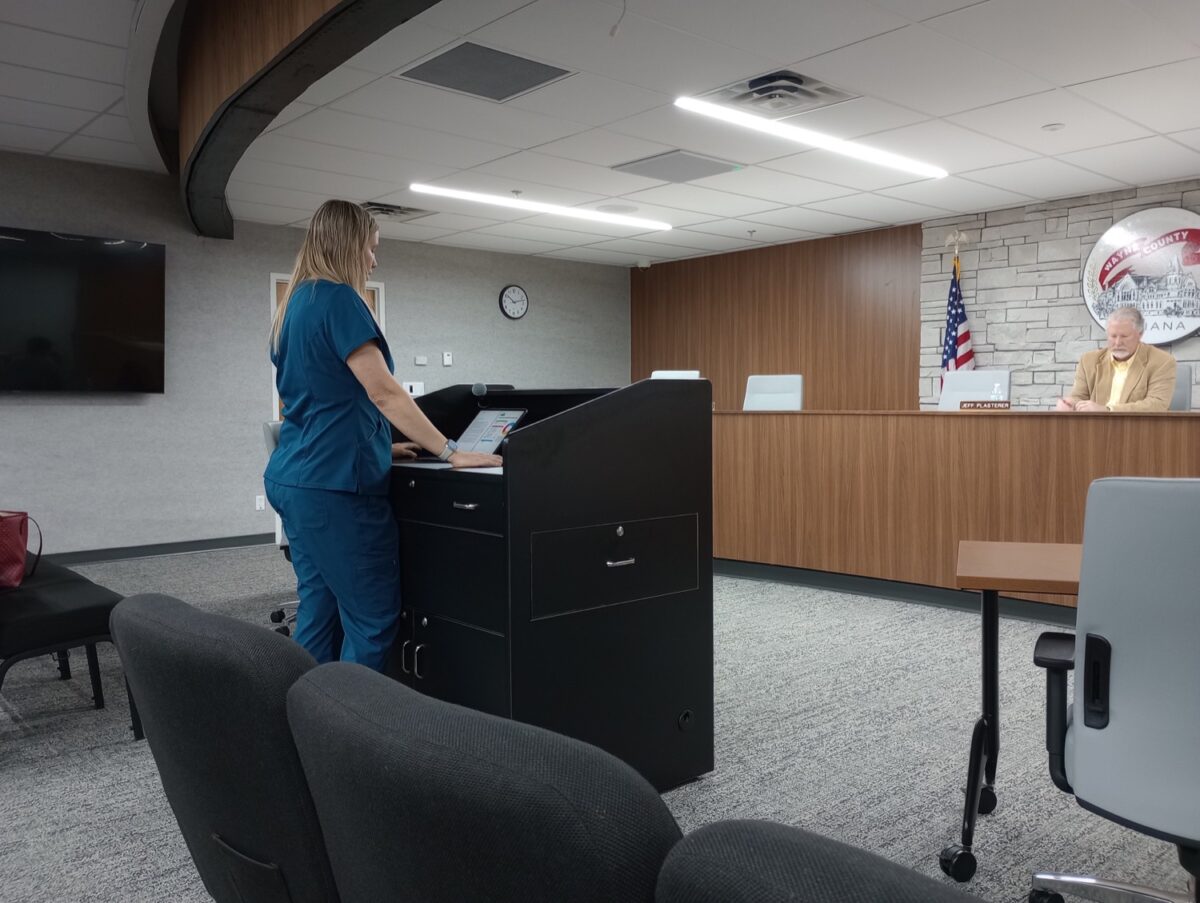The animal welfare project in Wayne County’s Hoosier Enduring Legacy Program began by sniffing out possibilities and is now digging up real solutions.
Dr. Stacy Kostiuk, a local veterinarian, updated the county’s commissioners Nov. 13 about progress she’s made implementing ideas to alleviate the county’s issue with cats and dogs. Part of her presentation included eight items that would cost $14,350 from the $100,000 allocated to the HELP project.
National consultant Sara Pizano conducted an assessment and provided ideas, costing $40,000 that was split equally between the county and Richmond. Kostiuk has now been contracted for $30,000 to begin implementation. After paying for a couple of trap-spay/neuter-release programs, the HELP fund has about $26,000 remaining.
Commissioners Jeff Plasterer and Brad Dwenger approved the county’s $7,175 share of Kostiuk’s request. Commissioner Mary Anne Butters, a vocal animal welfare advocate, could not attend the meeting.
Kostiuk said changes are being made in data collection by implementing new call codes when law enforcement is dispatched to handle animal issues. Additional codes provide detailed information about the call type and its resolution.
A web page listing pet resources, an interactive section for lost and found pets, and mapping for cat colonies is also in development. Kostiuk also wants to initiate a pet resource center with one contact number that could direct someone to the best option and, if affording fees is a problem, find out how much help someone needs.
Kostiuk also wants to provide the Wayne County Sheriff’s Office and Richmond Police Department animal control officers with deterrent kits and foster kits. The deterrent lights help move nuisance cats, and the foster kit provides items such as food and leashes. Kostiuk wants to empower people finding lost dogs or cats to foster them for a few days rather than taking found pets to a shelter immediately, which lessens the chance of reunification with the pet’s family.
The budget includes $1,700 for nine additional microchip scanners and $1,600 for 500 microchips. Kostiuk said implanting a microchip is as easy as giving a vaccine, and thought a public clinic somewhere like the Wayne County Fairgrounds would be helpful.
“That could impact a lot of people in a positive way in terms of being able to get those animals back to their owners if they’re lost,” Plasterer said.
Kostiuk also advocates that Richmond replace its current registration tags with microchips.
Four Directions, a Fort Wayne-based mobile spay and neuter initiative, has been scheduled for two three-day visits to Wayne County. Each visit will handle 15 dogs and 40 cats with a budget of $1,950. Kostiuk said the dog clinics on Mondays would be at Animal Care Alliance and wants the cat clinics to move throughout the county.
If the initial visits are a success, more would be scheduled.
Two trap-spay/neuter-release efforts have also been scheduled to target cat colonies. Kostiuk budgeted $2,475 for each effort and another $2,150 to purchase 20 more traps to assist those efforts.
Plasterer and Dwenger were pleased with the efforts underway.
“I think we’re definitely making progress,” Dwenger said.
READI 2.0
The Indiana Economic Development Corp. is requesting commitments of local public funding as part of its award process for Regional Economic Acceleration Development Initiative 2.0 grants. Dollars spent during the previous year can be applied toward those matches.
Commissioners were asked to consider recommending to Wayne County Council to authorize the funding commitments. They supported that request 2-0.
The Hoosier Enduring Legacy Program includes $2 million for downtown revitalization programs. That and another $1 million from Wayne County’s Economic Development Income Tax funding in 2026 and 2027 would serve as a match for $3 million from READI for additional downtown revitalization.
The HELP program also includes $780,000 for blight elimination that is acceptable as the match for a proposed Starr neighborhood program. Between 20 and 40 empty properties would be acquired and made available to builders to renovate and sell single-family homes through five years. The Economic Development Corp. of Wayne County would also pay $40,000 a year for those five years from Consolidated EDIT to a land-bank company as part of the project.
A third project does not involve a county commitment. Richmond would take empty properties from its blight elimination program and hire a developer to in-fill owner-occupied housing on those lots. That involves an $800,000 city commitment.
Other business
- Passed the initial resolution necessary to withdraw from Wayne Union Recycling. The county’s withdrawal will dissolve the organization, effective Dec. 31.
- Brandon Sanders, the county engineer, informed commissioners that the Indiana Department of Transportation has agreed to contribute an additional $550,000 to rebuild the Heiney Road bridge. Brumbaugh Construction received the contract for $1,770,000.
- As the drainage board, approved the drainage plan for a new home to be constructed at 6847 Arba Pike between Wallace and Pleasant Plain roads.
- Reappointed Plasterer, Beth Leisure and Pat Orzechowski to one-year terms on the Wayne County Convention and Tourism board.
A version of this article appeared in the November 20 2024 print edition of the Western Wayne News.

